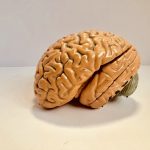Brain Fog And Blurry Thinking: How To Tackle Pandemic Memory Loss
This is a writeup on a recent article in IRISH EXAMINER, entitled “Brain Fog And Blurry Thinking: How To Tackle Pandemic Memory Loss”.
Repeated lockdowns, where weeks and months merged into each other, have taken a toll on our ability to recall. But there are ways to move beyond it, say the experts.

Have you been forgetting birthdays, films you have watched, names of faces?
You are not alone. According to psychologists, we are emerging from two years of blur into a brain fog when days bleed into weeks and time has so few boundaries that everything feels the same. You are experiencing pandemic memory loss. With no diary dates and no birthday celebrations, the usual reference points that are crucial for memories to be cemented in our minds, we are finding ourselves in a pandemic memory hole.
Repeated lockdowns, where weeks and months merged into each other, have taken a toll on our ability to recall. The pandemic has resulted in a surge of fuzzy memories and hazy recollections. With few Christmas gatherings, annual holidays, birthday parties or celebrations such as weddings and christenings to define each passing 12 months, the recent past may seem shuffled and disordered.
According to Dr. Sabina Brennan, a neuroscientist at Trinity College Dublin and author of Beating Brain Fog, the pandemic has resulted in a surge of fuzzy memories and hazy recollections. “A lot of people are experiencing foggy thinking,” she says. “The classic signs are not thinking straight or being unable to concentrate, struggling to remember things you did even fairly recently.”
More examples of foggy thinking

Results of a study, reported in the Journal of Clinical Medicine, showed a decrease in working memory and prospective memory (remembering to perform a planned action in the future). And they said a dearth of “external cues” that prompt us to do something – such as walking past a doctor’s surgery, that might trigger a reminder that we need to call the surgery – were likely to blame.
Mask wearing hasn’t helped us to remember faces either. Psychologists from Ariel University in Israel assessed the impact of mask-wearing and found it was likely to “interfere with normal speed and accuracy” of recognizing and remembering people. Writing in the journal Frontiers In Psychology, they concluded that “masks hinder specific features” that we need to recall faces.
Coronavirus may also have affected our cognitive function. In a recent paper, researchers from the University of Oxford’s Nuffield Department of Clinical Neurosciences have found that, if you have had Covid even mildly with no apparent long-term side effects, you might still experience brain fog for up to nine months afterwards.
You might experience brain fog for up to nine months after the last lockdown
In a recent paper, researchers from the University of Oxford’s Nuffield Department of Clinical Neurosciences have found if you have had Covid even mildly with no apparent long-term side effects you might still experience brain fog for up to nine months afterwards.
Tests with Brain Games
For their trial, published in the journal Brain Communications [exa.mn/Brain-Covid], the Oxford research team asked participants to complete brain games that tested their memory and cognitive ability. Results showed that while the Covid group performed well in most of the cognitive assessments, their scores for episodic memory – recalling personal experiences, including what happened where and when – were significantly worse for up to six months after infection. They also displayed a greater decline in their ability to sustain attention over time than uninfected individuals.
“What’s surprising is that although our Covid-19 survivors did not feel any more symptomatic at the time of testing, they showed degraded attention and memory,” says Dr Sijia Zhao of the Oxford research team. “Our findings reveal that people can experience some chronic cognitive consequences for months.”
But there are ways to move beyond it.
Experts tell us that there are ways we can move beyond this.
Five ways to improve your memory
Write things down
Using a paper diary or journal to record and plan events helps to cement them in our memory bank. According to Jennifer Wild, an Oxford University psychologist and author of Be Extraordinary, “writing is one of the best ways to help us to process and remember things.”
Rehearse experiences in your mind
Jennifer Wild continues: “Try to actively remember even small events like having coffee with friends. Go over in your mind what you said and where you were to crystallize the memory.”
Discuss plans
Make plans to go on holiday or out for a meal and then talk about them to friends and family. According to Jennifer Wild, “studies have shown that the language used to describe plans can really help you to remember them and even replacing a ‘dry’ word with a ‘juicier’ one in your mind can help.”
Update your memories regularly
As you start to recall recent events, make sure you update them as they pop into your mind. Thinking about weather, environment and what you were wearing helps to encode the memory. “Add new information as you think about them,” Jennifer Wild advises. “If you’re trying to remember something at work, add evidence and facts to polish up the memory.”
Exercise for at least 20 minutes daily
Exercise has a profound effect on our ability to remember. The main benefits come within the first 20 minutes when exercise helps our muscles to clear out harmful chemicals that may impair memory.
#############################
We hope you have enjoyed our writeup of the article “Brain fog and blurry thinking: how to tackle pandemic memory loss”. We would love to hear your thoughts about it, so please leave us a comment on the website.
#############################
Other brain games can be found under the heading “See Our Blogs”, by clicking any of the published blogs on the pages for the following categories:
“Brain Games For Children”
“Brain Games For Adults”
“Brain Games For Seniors”
“Advanced Brain Training”
“Optimal Brain Health”


